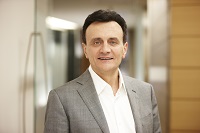 |
| AstraZeneca CEO Pascal Soriot |
AstraZeneca ($AZN) is continuing its campaign to refashion its image as it tries to shake off past setbacks and unsuccessful units and turn analysts' attention to its brightest pipeline prospects, particularly in cancer.
Facing a severe generic challenge to its big franchise for Nexium, AstraZeneca CEO Pascal Soriot is turning the full corporate spotlight on its prospects for immuno-oncology. After reviewing the numbers for Q1 Thursday morning, Soriot told analysts that he is advancing MEDI4736--an anti-PD-L1 immunotherapy--into Phase III after reviewing its performance in a Phase I trial.
Soriot had nothing to say about Pfizer's ($PFE) reported interest in buying the company.
The struggling pharma giant, which is trying mightily to impress analysts with its growing pipeline, also signaled that its lung cancer drug AZD9291--a third generation irreversible epidermal growth factor receptor TKI which has just been awarded "breakthrough" status by the FDA--is also headed directly into late-stage testing, alongside benralizumab and tralokinumab. Benralizumab is an IL-5 asthma drug and tralokinumab is an IL-13 anti-inflammatory.
These four new late-stage programs will make up a considerable portion of AstraZeneca's case that it has turned the corner in R&D, finding bright new prospects that can replace the drugs now confronted by generic competition. But Soriot will have a tough time convincing analysts at this stage, as they try to determine when AstraZeneca will hit the bottom of the revenue trough and start climbing back up again.
Central to its case is MEDI4736. With Merck ($MRK), Bristol-Myers ($BMY) and Roche ($RHHBY) leading the way in spurring an immune attack on cancer--a field with blockbuster potential--AstraZeneca will waste no time in trying to catch up with the leaders. Analysts puzzling out reports that Pfizer had made a tentative offer of about $101 billion for the company quickly seized on this program as one of the only clear reasons why Pfizer would be interested.
AstraZeneca is concentrating R&D on a few key areas: oncology, cardiovascular and metabolic diseases, and respiratory and inflammation, reports Reuters. And it's bowing out of two fields: anti-infectives and neuroscience drugs, looking to sell or partner out its therapies. At one stage neurosciences had been considered a top target for AstraZeneca, but a series of research setbacks forced the company to initially scale back R&D, touting a much smaller "virtual" team approach that evidently will now be jettisoned. There's no immediate word how many staffers will be cut loose as a result of its changing R&D focus, but the company has been axing thousands in recent years as it tries to hack its way down to a solid core.
AstraZeneca's decision to narrow its research focus fits into the growing trend of simplifying R&D strategies, an increasingly popular ploy in Big Pharma circles, as evidenced by the latest cancer-for-vaccines swap by GlaxoSmithKline ($GSK) and Novartis ($NVS).
"I am pleased with the significant progress we are making towards achieving scientific leadership in our core therapeutic areas," Soriot said in a statement. "We have confirmed our decision to advance four program to Phase III in oncology and respiratory disease. The Breakthrough Therapy designation for AZD9291 in non-small cell lung cancer and the Priority Review granted for olaparib in ovarian cancer by the FDA act as a reminder of the distinctive science that AstraZeneca can bring to patients."
- here's the release (PDF)
- read the report from Reuters
- and the story from the Financial Times
Special Report: 2013's 25 most influential people in biopharma - Pascal Soriot